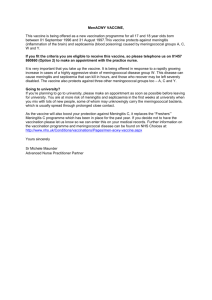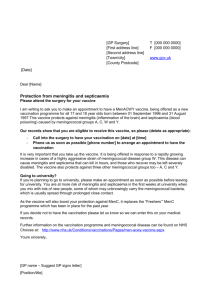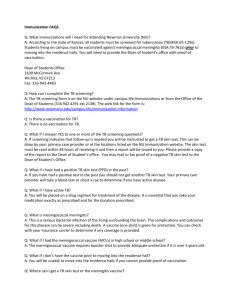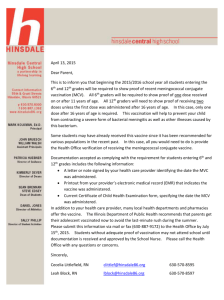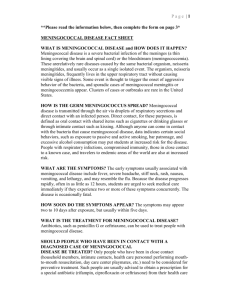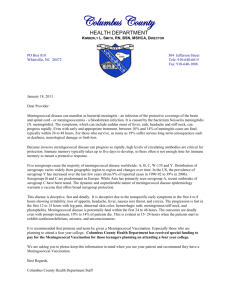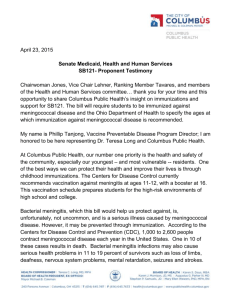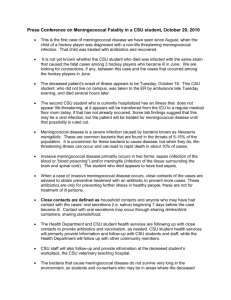VIS-_Menactra
advertisement
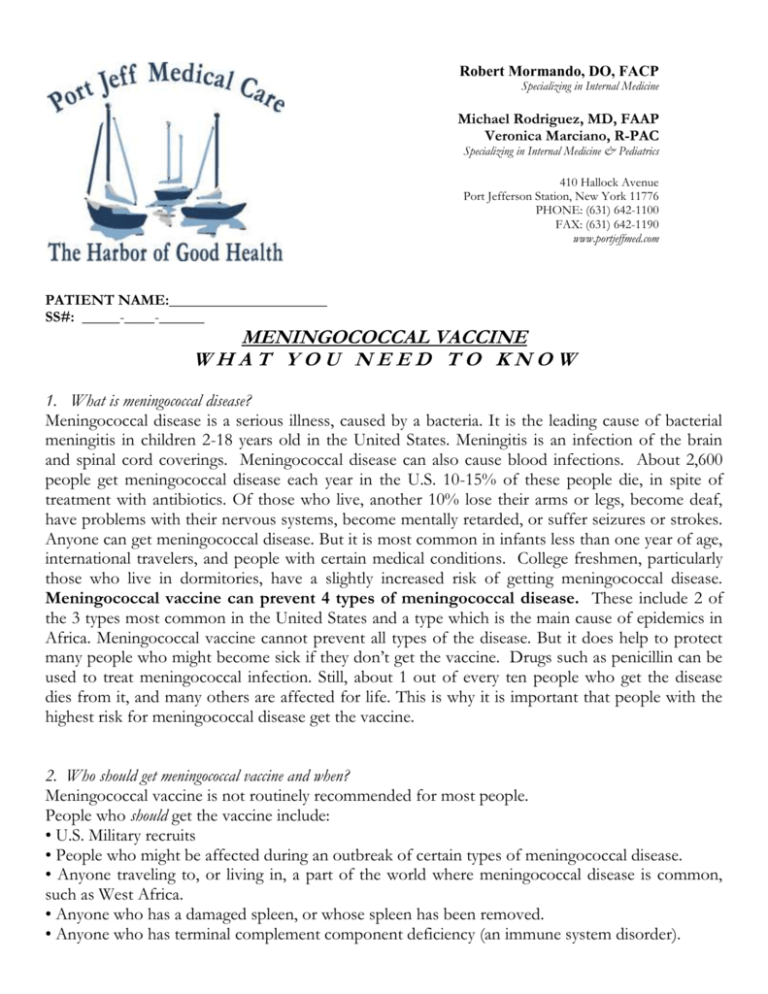
Robert Mormando, DO, FACP Specializing in Internal Medicine Michael Rodriguez, MD, FAAP Veronica Marciano, R-PAC Specializing in Internal Medicine & Pediatrics 410 Hallock Avenue Port Jefferson Station, New York 11776 PHONE: (631) 642-1100 FAX: (631) 642-1190 www.portjeffmed.com PATIENT NAME:_____________________ SS#: _____-____-______ MENINGOCOCCAL VACCINE WHAT YOU NEED TO KNOW 1. What is meningococcal disease? Meningococcal disease is a serious illness, caused by a bacteria. It is the leading cause of bacterial meningitis in children 2-18 years old in the United States. Meningitis is an infection of the brain and spinal cord coverings. Meningococcal disease can also cause blood infections. About 2,600 people get meningococcal disease each year in the U.S. 10-15% of these people die, in spite of treatment with antibiotics. Of those who live, another 10% lose their arms or legs, become deaf, have problems with their nervous systems, become mentally retarded, or suffer seizures or strokes. Anyone can get meningococcal disease. But it is most common in infants less than one year of age, international travelers, and people with certain medical conditions. College freshmen, particularly those who live in dormitories, have a slightly increased risk of getting meningococcal disease. Meningococcal vaccine can prevent 4 types of meningococcal disease. These include 2 of the 3 types most common in the United States and a type which is the main cause of epidemics in Africa. Meningococcal vaccine cannot prevent all types of the disease. But it does help to protect many people who might become sick if they don’t get the vaccine. Drugs such as penicillin can be used to treat meningococcal infection. Still, about 1 out of every ten people who get the disease dies from it, and many others are affected for life. This is why it is important that people with the highest risk for meningococcal disease get the vaccine. 2. Who should get meningococcal vaccine and when? Meningococcal vaccine is not routinely recommended for most people. People who should get the vaccine include: • U.S. Military recruits • People who might be affected during an outbreak of certain types of meningococcal disease. • Anyone traveling to, or living in, a part of the world where meningococcal disease is common, such as West Africa. • Anyone who has a damaged spleen, or whose spleen has been removed. • Anyone who has terminal complement component deficiency (an immune system disorder). The vaccine should also be considered for: • Some laboratory workers who are routinely exposed to the meningococcal bacteria. The vaccine may also be given to college students who choose to be vaccinated. College freshmen, specially those who live in dormitories, and their parents should discuss the risks and benefits of vaccination with their health care providers. Meningococcal vaccine is usually not recommended for children under two years of age. But under special circumstances it may be given to infants as young as 3 months (the vaccine does not work as well in very young children). Ask your health care provider for details. How many doses? For people 2 years of age and over: 1 dose (Sometimes an additional dose is recommended for people who continue to be at high risk. Ask your provider.) For children 3 months to 2 years of age who need the vaccine: 2 doses, 3 months apart 3. Some people should not get meningococcal vaccine or should wait. People should not get meningococcal vaccine if they have ever had a serious allergic reaction to a previous dose of the vaccine. People who are mildly ill at the time the shot is scheduled can still get meningococcal vaccine. People with moderate or severe illnesses should usually wait until they recover. Your provider can advise you. Meningococcal vaccine may be given to pregnant women. 4. What are the risks from meningococcal vaccine? A vaccine, like any medicine, is capable of causing serious problems, such as severe allergic reactions. The risk of the meningococcal vaccine causing serious harm, or death, is extremely small. Getting meningococcal vaccine is much safer than getting the disease. Mild problems Some people who get meningococcal vaccine have mild side effects, such as redness or pain where the shot was given. These symptoms usually last for 1-2 days. A small percentage of people who receive the vaccine develop a fever. 5. What if there is a serious reaction? What should I look for? Look for any unusual condition, such as a severe allergic reaction, high fever, or unusual behavior. If a serious allergic reaction occurred, it would happen within a few minutes to a few hours after the shot. Signs of a serious allergic reaction can include difficulty breathing, weakness, hoarseness or wheezing, a fast heart beat, hives, dizziness, paleness, or swelling of the throat. What should I do? • Call a doctor, or get the person to a doctor right away. • Tell your doctor what happened, the date and time it happened, and when the vaccination was given. • Ask your health care provider to file a Vaccine Adverse Events Reporting System (VAERS) form. Or call VAERS yourself at 1-800-822-7967 or visit their website at www.vaers.org. 6 How can I learn more? • Ask your doctor or nurse. They can give you the vaccine package insert or suggest other sources of information. • Call your local or state health department’s immunization program. • Contact the Centers for Disease Control and Prevention (CDC): -Call 1-800-232-2522 (English) -Call 1-800-232-0233 (Español) -Visit the National Immunization Program’s website at www.cdc.gov/nip -Visit the National Center for Infectious Disease’s meningococcal disease website at www.cdc.gov/ncidod/dbmd/diseaseinfo/meningococcal_g.htm -Visit CDC’s Travelers Health website at www.cdc.gov/travel U.S. DEPARTMENT OF HEALTH & HUMAN SERVICES Centers for Disease Control and Prevention National Immunization Program Vaccine Information Statement Meningococcal (7/28/2003) CONSENT I have reviewed the information above with the patient. If there are any questions or problems, the patient can call us at (631) 642-1100 Monday-Friday from 9AM-5PM. __LeeAnn Terranova, LPN __Nancy Diaz, LPN __Christina Foster, LPN __Dr. ______________________ Vaccine Given: __Rt __Lt __Deltoid __Thigh __Buttock Date:
